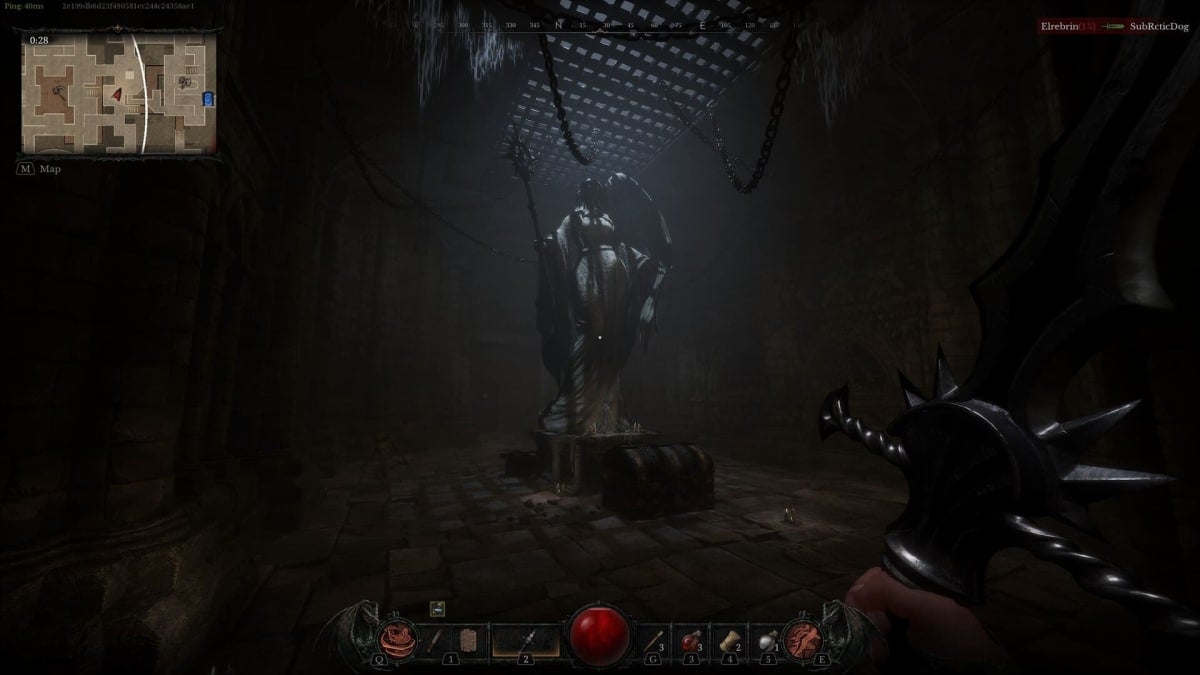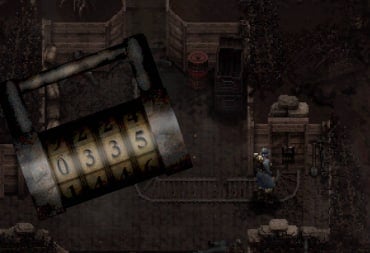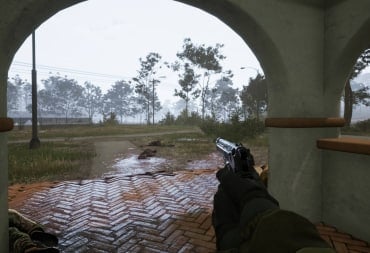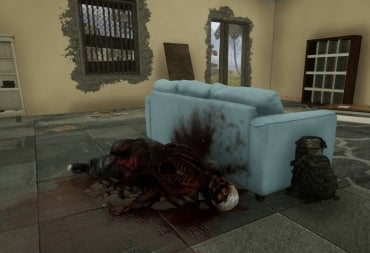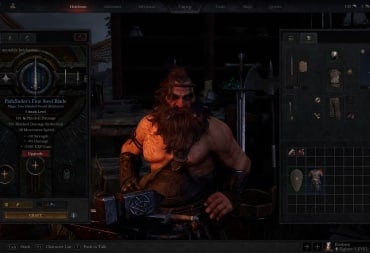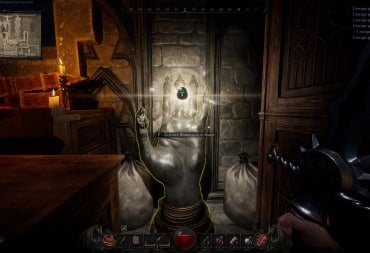Gamers who are no strangers to the PvPvE (Player vs. Player vs. Environment) genre know that it can be a tough and unforgiving world. Your success depends on you getting out alive, and I wanted to put together a Dungeonborne Guide for players that may be looking for some tips and tricks to enhance their experience.
If you're a new player getting started, this should help you as you make your first few delves, and for experienced players - this guide may still have some nuggets for you!
Picking Your Class
There are 8 different Dungeonborne Classes to choose from, all typical archetypes in the RPG world. What you pick can not only compliment your playstyle, but also help with survivability.
- Fighter - DPS / Tank
- Great for solo survival, or team fighting.
- Priest - Healer
- Best in a team, can heal and revive teammates.
- Rogue - High DPS
- Great solo when utilizing stealth, compliments a team well to surprise during team fights.
- Pyromancer - Long Ranged DPS
- Good in both Solo and Team scenarios, can put down solid damage from afar.
- Death Knight - Close Range DPS
- Good in both Solo and Team scenarios, the Death Knight can pull enemies to it and then damage with sword and AoE Ability.
- Cryomancer - Team DPS
- Best in a team scenario, the Cryomancer will be able to crowd control groups of enemies and damage/slow them.
- Swordmaster - Close Range DPS
- Good in both Solo and Team scenarios, the Swordmaster can quickly chase down enemies and take them down.
- Druid - Tricky DPS
- The Druid is good in Solo and Team scenarios, but it's a class that takes some additional skill to master. Panther form can do solid damage, and summon treants for additional damage.
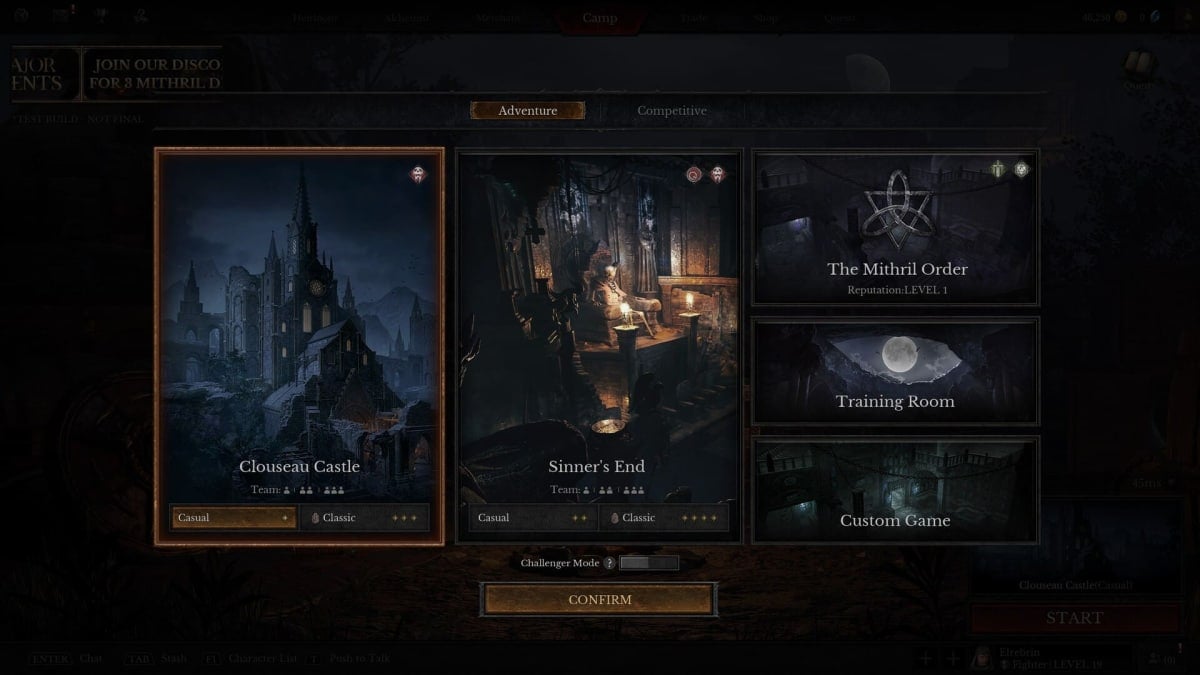
Delving Into The Dungeon
Once you've selected your class - you won't have much else to do to your character other than to delve into the dungeon and start collecting gear. Opening the dungeons, brand-new players should start in Clouseau Castle, Casual. This is a relaxed format that has a time limit, but no closing circle in the arena.
- Clouseau Castle - Starter Dungeon
- Casual - Any level/gear is fine. This is the best starter dungeon to focus on.
- Classic - Requires Level 6 Gear Score, circle closes over time, enemies have more health and damage.
- Sinner's End - Advanced Dungeon
- Casual - Any level/gear is fine, but I'd highly recommend having at least 2 Heirlooms before diving here. The enemies do more damage than those in Clouseau.
- Classic - Requires Level 9 Gear Score, circle closes over time, enemies have more health and damage.
You'll have two main priorities as you first start delving: Collect as much grey gear as possible, and then escape the dungeon successfully with it.
Explore Clouseau Castle, focusing on taking down enemies and collecting loot. Enemies will drop some gear and loot, but chests will usually have the more definite drops of weapons and armor that you'll want to leave the dungeon with.
- If you find any Elixirs (Restoration, Ferocity, Protection) - take them immediately. They'll last for the entire dungeon, and can't be carried out with you.
Avoid any non-blue or green valuables, they're not worth your time, being only worth 10 and 20 Gold each. Your focus should 100% be on gear that you can escape with to dismantle.
- Note: "Broken" Equipment can't be dismantled, so drop any that you have in your inventory.
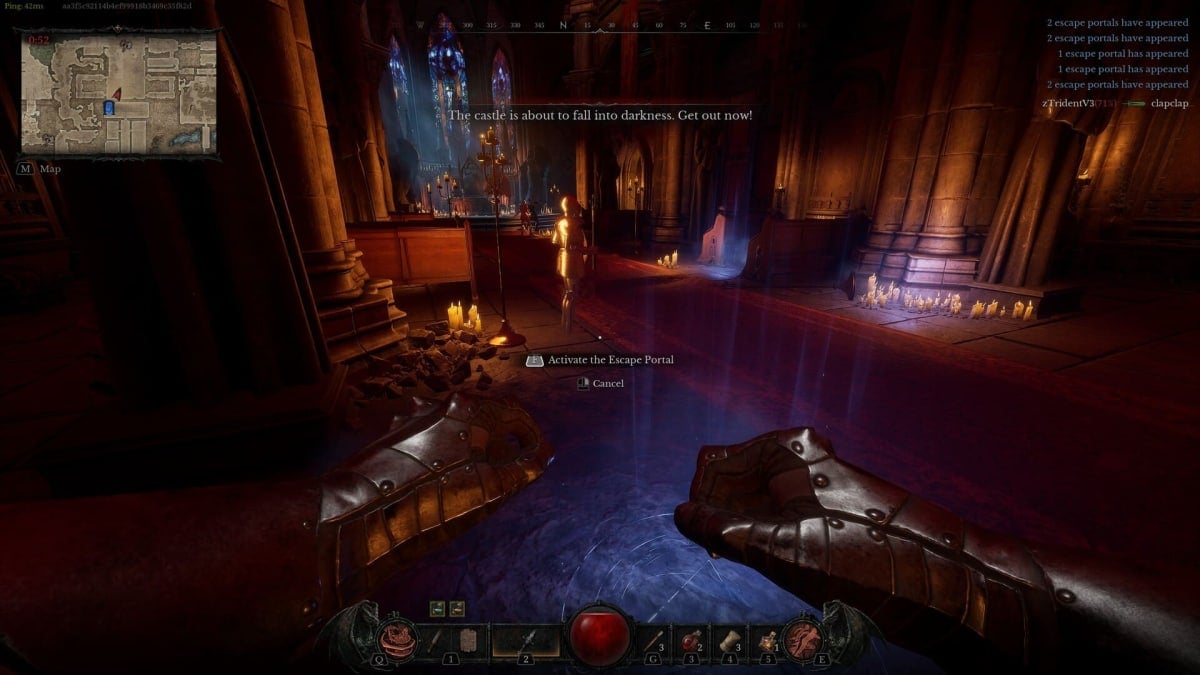
As the end of the timer elapses, more escape portals will open up - generally they spawn the most in open areas, so if you're having trouble finding one - head towards those.
Opening a portal is the most dangerous part of the delve - unless you have a Ritual Scroll (which show on the map), other players will see that you're trying to escape and likely try and jump you.
But, should you succeed - you'll get out with some experience and much-needed gear.
Gearing Up Between Delves
Once you've escaped a dungeon, and you have a bag full of loot, there's a few things to do before you dive back in.
- Sell any valuables (not equipment) in your inventory (Cups, Sculptures, etc) to the Merchant.
- Purchase any "Free" Items from the Merchant - Check ALL tabs.
- Free Stock refreshes every 7 days, offering more free Cloudy Life Essence and Mithril Dice every week.
- Move any gear you want to keep into your Stash (Tab)
- CRITICAL - Under the Heirloom Tab, dismantle any/all weapons, armor, and accessories you don't need. You want to get to 300 Rough White Iron ASAP.
- Later on, you'll be upgrading this gear too.
- Craft any potions and bandages (recommend 4 of each) at the Alchemist.
Once you've emptied your inventory, and your gear is in good shape, it's time to delve again. You should be delving in Clouseau Castle until you've unlocked at least 3 different pieces of Heirloom Gear - which will take 8-900 Rough White Iron to unlock.
I won't go into a ton of detail in this guide, but unlocking and later upgrading this gear is critical, which is why I also wrote a Dungeonborne Heirloom Gear Guide - it's easily the BEST way to gear up without spending a significant amount of gold.
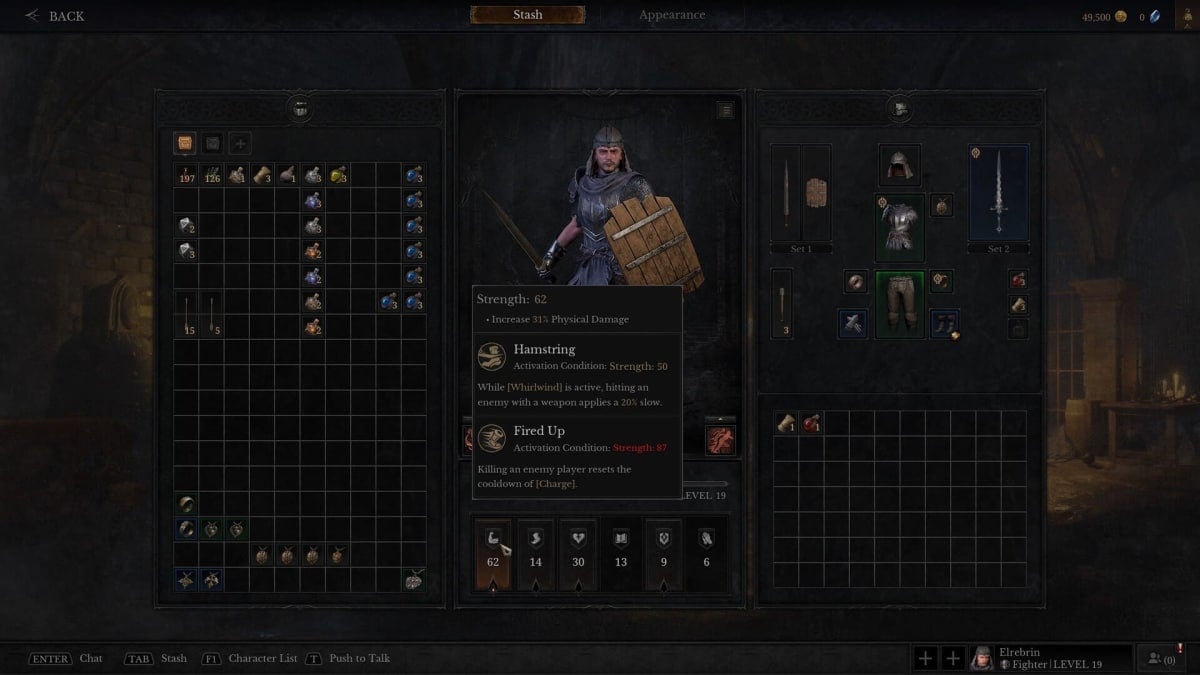
Leveling Up & Focusing on Stats
With each successful delve, you're going to gain more experience to level up your character - each level will improve 1 or 2 of your main stats, such as Stamina or Strength. This doesn't have a massive impact on your overall damage output, but what's important about leveling up and increasing your stats is that it unlocks your passive Skills.
If you open your character tab - you'll see the six different stats available to all characters, with your character's main stats having an arrow underneath each one. Hovering over these skills tell you what stat number you need to hit in order to unlock one or multiple passive skills.
Alongside leveling up, gearing up becomes even more important beyond base damage and resistance, much of the higher level gear will give you boosts to your stats in order to hit these thresholds to unlock passive skills.
As you gear up between delves, as well as pick up new equipment in those delves, make sure you're prioritizing the stats that will help unlock new passives.
I know I'm also harping hard on Heirloom Gear, but it's also critical to leveling. Each piece of Heirloom Gear has a +XXX% EXP Gain trait, and as you upgrade that gear, it will supercharge your character leveling. For example, A blue Two-Handed Sword, with a Green Chest Piece, and Green Ring is worth +300% EXP gain!
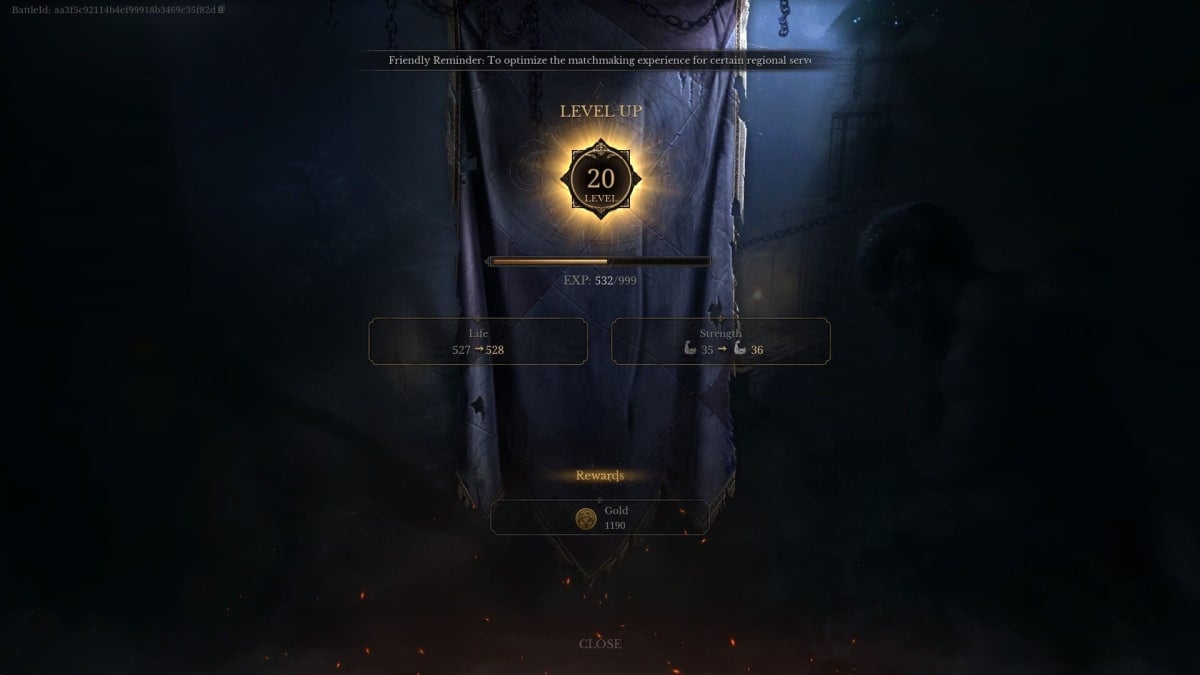
Continuing to Delve and Advance
That's really the main gameplay loop of Dungeonborne. You're going to need to delve over and over again, focusing on finding and dismantling grey gear, then moving up to green and blue as you upgrade your different heirlooms.
Once you've unlocked 3 different pieces of heirloom gear, you'll be safe to start delving into Clouseau Castle Classic, as well as Sinner's End Casual - both of these dungeons will offer a higher chance to collect green and blue gear, helping you continue to grow your strength and surviveability.
As you start each new character (because why only play one, right?) you're going to need to collect Heirloom Resources too, not every class can wield the same pieces of Heirloom gear, but some do share that gear and can use it. Unlocking it once, will unlock it across all characters.
That's it for my Tips & Tricks - I primarily focused on Adventure Mode, but as new modes, skills, and changes become available on the roadmap, I'll make sure to update this guide!
Have a tip, or want to point out something we missed? Leave a Comment or e-mail us at tips@techraptor.net
